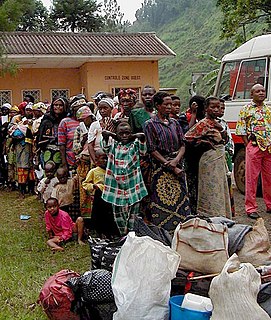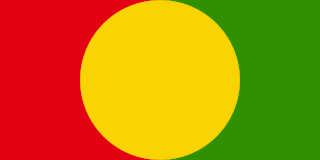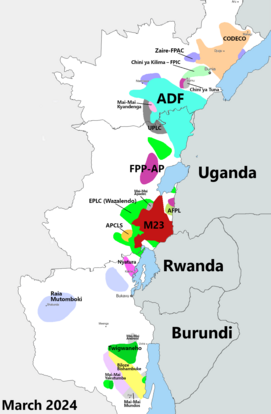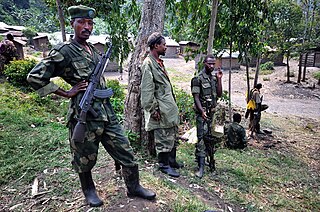Discovered in the 1990’s, human remains in the Democratic Republic of the Congo have been dated to approximately 90,000 years ago. The first real states, such as the Kongo, the Lunda, the Luba and Kuba, appeared south of the equatorial forest on the savannah from the 14th century onwards.

The Second Congo War began in the Democratic Republic of the Congo in August 1998, little more than a year after the First Congo War, and involved some of the same issues. The war officially ended in July 2003, when the Transitional Government of the Democratic Republic of the Congo took power. Although a peace agreement was signed in 2002, violence has continued in many regions of the country, especially in the east. Hostilities have continued since the ongoing Lord's Resistance Army insurgency, and the Kivu and Ituri conflicts.

The Allied Democratic Forces is an Islamist rebel group in Uganda and the Democratic Republic of the Congo (DRC), considered a terrorist organisation by the Ugandan government. It was originally based in western Uganda but has expanded into the neighbouring DRC.

The Democratic Forces for the Liberation of Rwanda is an armed rebel group active in the eastern Democratic Republic of the Congo. It has survived by preying on the Congolese population. As an ethnic Hutu group opposed to the ethnic Tutsi influence, the FDLR is one of the last factions of Rwandan rebels active in the Congo. It was founded through an amalgamation of other groups of Rwandan refugees in September 2000, including the former Army for the Liberation of Rwanda (ALiR), under the leadership of Paul Rwarakabije. It was active during the latter phases of the Second Congo War and the subsequent insurgencies in Kivu.
Congolese history in the 2000s has primarily revolved around the Second Congo War (1998–2003) and the empowerment of a transitional government.

The Kivu conflict began in 2004 in the eastern Congo as an armed conflict between the military of the Democratic Republic of the Congo (FARDC) and the Hutu Power group Democratic Forces for the Liberation of Rwanda (FDLR) in the Democratic Republic of the Congo. It has broadly consisted of three phases, the third of which is an ongoing conflict. Prior to March 2009, the main combatant group against the FARDC was the National Congress for the Defence of the People (CNDP). Following the cessation of hostilities between these two forces, rebel Tutsi forces, formerly under the command of Laurent Nkunda, became the dominant opposition to the government forces.
Bosco Ntaganda is a convicted war criminal and the former military chief of staff of the National Congress for the Defense of the People (CNDP), an armed militia group operating in the North Kivu province of the Democratic Republic of the Congo (DRC). He is a former member of the Rwandan Patriotic Army and allegedly a former Deputy Chief of the General Staff of the Patriotic Forces for the Liberation of Congo (FPLC), the military wing of the Union of Congolese Patriots.

The 2008 Nord-Kivu campaign was an armed conflict in the eastern Nord-Kivu province of the Democratic Republic of the Congo. The upsurge of violence in the Kivu conflict saw heavy battles between the Democratic Republic of Congo's army, supported by the United Nations, and Tutsi militia under General Laurent Nkunda.

The National Congress for the Defence of the People is a political armed militia established by Laurent Nkunda in the Kivu region of the Democratic Republic of the Congo in December 2006. The CNDP was engaged in the Kivu conflict, an armed conflict against the military of the Democratic Republic of the Congo. In January 2009, the CNDP split and Nkunda was arrested by the Rwanda government. The remaining CNDP splinter faction, led by Bosco Ntaganda, was planned to be integrated into the national army.
The Rally for Congolese Democracy–Goma was a faction of the Rally for Congolese Democracy, a rebel movement based in Goma, Democratic Republic of the Congo (DRC) during the Second Congo War (1998–2003). After the war, some members of the group continued sporadic fighting in North Kivu. The movement also entered mainstream politics, participating in democratic elections with little success.

Rutshuru Territory is a territory in the North Kivu province of the eastern Democratic Republic of the Congo (DRC), with headquarters is the town of Rutshuru.

The M23 rebellion was an armed conflict in North Kivu, Democratic Republic of the Congo (DRC), that occurred between the March 23 Movement and government forces. The rebellion was part of continued fighting in the region after the formal end of the Second Congo War in 2003. It broke out in 2012 and continued into 2013, when a peace agreement was made among eleven African nations, and the M23 troops surrendered in Uganda.

The March 23 Movement, often abbreviated as M23 and also known as the Congolese Revolutionary Army, was a rebel military group based in eastern areas of the Democratic Republic of the Congo (DRC), mainly operating in the province of North Kivu. The 2012 M23 rebellion against the DRC government led to the displacement of large numbers of people. On 20 November 2012, M23 took control of Goma, a provincial capital with a population of one million people, but was requested to evacuate it by the International Conference on the Great Lakes Region because the DRC government had finally agreed to negotiate with them. In late 2013 Congolese troops, along with UN troops, retook control of Goma and M23 announced a ceasefire, saying it wanted to resume peace talks.

Colonel Sultani Makenga is the military chief of the March 23 Movement, a rebel military group based in eastern areas of the Democratic Republic of the Congo. Makenga is an ethnic Tutsi and was raised in South Kivu. He fought for the Rwandan Patriotic Front during the Rwandan Civil War.
Bertrand Bisimwa is a Congolese rebel and human rights activist. He is the president of the March 23 Movement, often abbreviated M23 and also known as the Congolese Revolutionary Army, a rebel military group based in eastern areas of the Democratic Republic of the Congo (DRC). Bisimwa is trained as a lawyer.

The United Nations Force Intervention Brigade (FIB) is a military formation which constitutes part of the United Nations Organization Stabilization Mission in the Democratic Republic of the Congo (MONUSCO). It was authorized by the United Nations Security Council on 28 March 2013 through Resolution 2098. Although it is not the first instance in which the use of force was authorized by the UN, the Force Intervention Brigade is the first UN peacekeeping operation specifically tasked to carry out targeted offensive operations to "neutralize and disarm" groups considered a threat to state authority and civilian security. In this case, the main target was the M23 militia group, as well as other Congolese and foreign rebel groups. While such operations do not require the support of the Armed Forces of the Democratic Republic of the Congo (FARDC), the Force Intervention Brigade often acts in unison with the FARDC to disarm rebel groups.

The Allied Democratic Forces insurgency is an ongoing conflict waged by the Allied Democratic Forces in Uganda and the Democratic Republic of the Congo, against the governments of those two countries and the MONUSCO. The insurgency began in 1996, intensifying in 2013, resulting in hundreds of deaths. The ADF is known to currently control a number of hidden camps which are home to about 2,000 people; in these camps, the ADF operates as proto-state with "an internal security service, a prison, health clinics, and an orphanage" as well as schools for boys and girls.
The following lists events that happened during 1998 in the Democratic Republic of the Congo.
The Nduma Defense of Congo is a militia that operates in the eastern Democratic Republic of the Congo as part of the Kivu conflict. Mai-Mai groups are militia unique to the eastern DRC, formed ostensibly to defend villages from attacks from Rwandan forces and Rwandan-backed rebel groups. However, Mai-Mai groups have been accused of sexual violence, looting, and fighting all sides including fellow militias, the DRC Army, and the United Nations.
Bunagana–Rutshuru–Goma Road, is a road in Uganda and the Democratic Republic of the Congo, connecting the towns of Bunagana in Uganda with Bunagana in DRCongo. In addition the road connects these two towns to Bugani, Rutshuru, Rumangabo, Buhumba and Goma, all in DRCongo.











